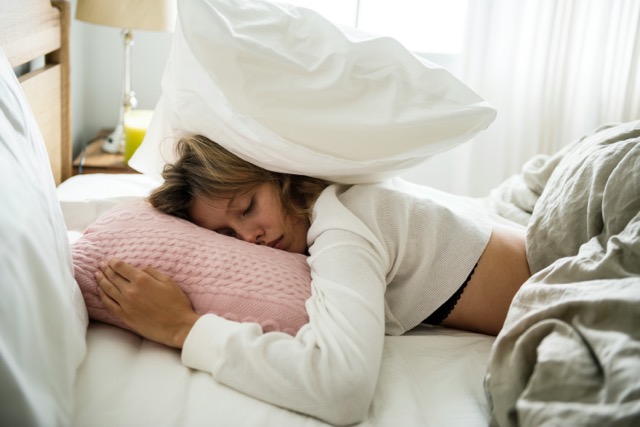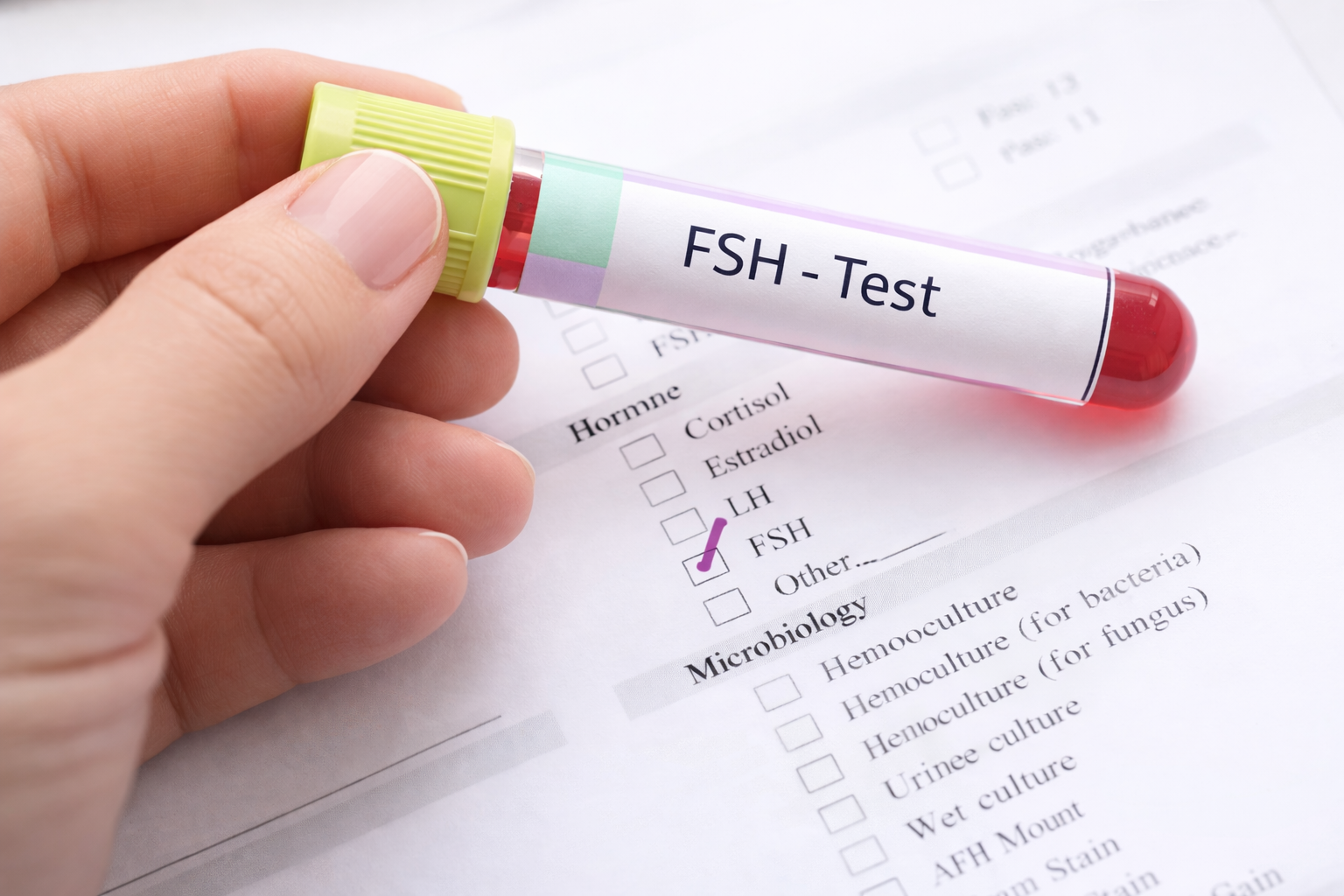Whether it’s nighttime sleep problems or daytime exhaustion, perimenopause fatigue can leave you totally drained. Here’s what causes this common perimenopause symptom, and how you can find relief.

Whether it’s nighttime sleep problems or daytime exhaustion, perimenopause fatigue can leave you totally drained. Here’s what causes this common perimenopause symptom, and how you can find relief.
You’re exhausted all the time, but you can’t fall asleep at night. When you do finally drift off, you sleep fitfully and wake up too early, feeling unrested and just as tired as the day before.
There’s a reason for this: perimenopause fatigue. You’re not imagining things, you really are sleep-deprived – just like millions of other people in perimenopause. In fact, nearly 1 out of 2 perimenopausal women have trouble sleeping [1]!
Why does perimenopause cause fatigue, and how can you get better sleep and boost your energy levels? Read on to find out.
Does perimenopause cause fatigue?
Let’s cut to the chase: does perimenopause cause fatigue? Yes, absolutely. Perimenopause fatigue is a common symptom experienced by many during the menopausal transition.
Perimenopause fatigue is often (but not exclusively) associated with trouble sleeping at night. When you don’t get enough quality sleep, it’s no wonder you’re tired! But perimenopause fatigue stems from other causes, too, beyond just nighttime sleep troubles.
Why am I so tired during perimenopause?
We know perimenopause makes you tired, but why? There are lots of different factors in play, ranging from the biological and hormonal changes behind perimenopause, to other perimenopause symptoms that zap your energy.
Let’s examine what causes perimenopause fatigue.
Do hormone fluctuations impact energy levels?
Perimenopause is driven by changes in reproductive hormones. Estrogen and progesterone, for example, fluctuate unpredictably and decline over time, and the research shows that these fluctuations impact energy levels.
This is partly because estrogen and progesterone are involved in the systems that make you sleep – and sleep well. Estrogen, for instance, blocks the brain chemicals that wake you up, helping you sleep through the night [1]. It also helps you fall asleep faster, sleep more deeply, and stay asleep longer [2].
Plus, estrogen and progesterone regulate your circadian rhythm and produce melatonin, two key factors for good sleep [3]. Your circadian rhythm is your body’s sleep-wake cycle, determining when you go to sleep and wake up each day. Melatonin is a hormone that makes you feel tired at bedtime.
As estrogen and progesterone fluctuate and decline during perimenopause, it becomes harder for them to properly regulate your sleep. That makes it harder for you to get quality sleep, and when you don’t sleep well, you’re more likely to experience perimenopause fatigue during the day.
Do other perimenopause symptoms impact energy levels?
Hormone fluctuations cause lots of other perimenopause symptoms, too, many of which contribute to perimenopause fatigue.
Here are just some of the perimenopause symptoms that can make you tired:
- Night sweats (vasomotor symptoms): Nighttime hot flashes can jolt you awake or make it impossible to fall asleep. People with more severe night sweats are more likely to experience insomnia [4].
- Sleep disturbances: 47% of perimenopausal people experience sleep disturbances like trouble falling asleep, waking up frequently at night, or waking up too early [1].
- Perimenopause brain fog: Brain fog can make you spend more energy just to function throughout the day, leaving you exhausted.
- Stress and other mood symptoms: Increased stress, mood swings, and emotional turmoil during perimenopause can drain you physically and emotionally.
- Physical changes: Weight gain and bloating can impact nighttime breathing, potentially waking you up at night as your body adjusts oxygen intake [1].
Plus, additional perimenopause-related factors can make you feel tired and low-energy:
- Nutritional deficiencies: Chronic fatigue could be linked to low levels of iron, vitamin D, and vitamin B12 [5]. The likelihood of developing these nutritional deficiencies (and others) increases during perimenopause and beyond [6].
- Daily stressors: The daily mental and physical demands of midlife are tiring already. With the added tolls perimenopause takes on your mind and body, it’s no wonder you’re exhausted.
Does menopause make you tired, too?
For some people, sleep problems may start to improve with official menopause (that is, once you’ve gone 12 consecutive months without a period) [4]. Beyond menopause, in other words, you may start to sleep better.
But this isn’t the case for everyone. Menopause can make you tired, too. Menopause fatigue is also frustratingly common, affecting up to 60% of people [1].
What’s the difference between perimenopause fatigue and menopause fatigue?
Perimenopause fatigue and menopause fatigue share many similarities, but part of where they differ is in their causes.
Menopause fatigue is linked to low hormone levels, rather than fluctuations (hormones stabilize after menopause). Plus, certain fatigue-inducing health factors become more likely after menopause, including insomnia, sleep apnea, restless leg syndrome, and frequent nighttime bathroom trips (nocturia) [1].
From your point of view, though, fatigue may well feel the same whether you’re in perimenopause or beyond.
How to combat perimenopause fatigue
Faced with the many factors driving perimenopause fatigue, feeling tired and low energy is completely understandable.
But you don’t have to accept exhaustion as your new normal!
There are ways to combat perimenopause and menopause fatigue, starting with daily habits, lifestyle strategies, and nutrition-based approaches to support energy and improve sleep:
- Create your optimal sleep environment: Make your bedroom cool, dark, and quiet for a sleep environment that’s cozy and prime for Zs.
- Develop a relaxing bedtime routine: A wind-down routine prepares your body and mind for sleep. Try calming, screenless activities like reading, a bath, meditation, or other relaxation techniques.
- Stick to a regular sleep schedule: Train your body for sleep by going to bed and waking up around the same time each day.
- Keep a regular meal schedule: Eating regular meals helps maintain your circadian rhythm [7]. Have dinner earlier so your body has ample time to settle into sleep mode.
- Eat a balanced, nutritious diet: Healthy diets support better sleep and increased energy. Foods like eggs, fish, nuts, pumpkin seeds, cherries, and strawberries may help boost melatonin production [7].
- Hydrate regularly, but not right before bed: Drink water throughout the day so you aren’t parched at night, and avoid too much fluid before bed to reduce nighttime bathroom trips.
- Limit caffeine and alcohol: Cutting back on coffee and alcohol reduces the negative impact these substances can have on sleep.
- Exercise regularly: Regular exercise, both low- and high-intensity, can improve sleep quality [3]. Just avoid intense workouts too close to bed.
- Consider cognitive behavioral therapy (CBT): CBT is a powerful tool for addressing perimenopause sleep problems, helping you rewire your mindset around sleep to develop good sleep habits and improve sleep quality [8].
- Try supplements for perimenopause fatigue: Talk to your doctor about whether supplements could be right for you. Vitamins for perimenopause fatigue and menopause fatigue include B vitamins, magnesium, and zinc [7].
When you sleep better at night, you may find that your daytime perimenopause fatigue improves and you feel more energized.
Plus, emerging research from Oova suggests that longer sleep may even help manage perimenopause estrogen levels [9]. In other words, optimizing your sleep to combat perimenopause fatigue could also help stabilize hormone fluctuations and ease other perimenopause symptoms.
When to seek professional support for perimenopause fatigue
If sleep-friendly lifestyle strategies don’t improve perimenopause fatigue, it may be time to talk to your doctor.
Consider seeking professional support if exhaustion suddenly gets worse, you can’t function daily, or you’d just like some extra help with understanding your perimenopause journey and building a holistic approach.
Medication that treats perimenopause symptoms by stabilizing hormone fluctuations, like hormone replacement therapy (HRT) and hormonal birth control, can help you manage sleep and ease perimenopause fatigue. Sleep medication can be used in the short term in certain cases, but long-term use generally isn’t recommended.
Perimenopause fatigue: The bottom line
Perimenopause fatigue is a common experience, often linked to hormone fluctuations and other perimenopause symptoms, including night sweats, sleep disturbances, and brain fog.
Remember that you don’t need to accept constant fatigue as an inevitable part of getting older. Consider adopting strategies to build healthy sleep habits, and talk to your doctor for help as needed. With support and lifestyle adjustments, you can manage perimenopause fatigue and regain your energy.
About the author

Sources
- Troìa L, et al. (2025). Sleep Disturbance and Perimenopause: A Narrative Review
- Lee J, et al. (2019). Sleep Disorders and Menopause.
- Park KM, et al. (2024). Sleep Disturbance in Perimenopausal Women.
- Delamater L & Santoro N. (2018). Management of the Perimenopause.
- Harvard Health. (2015). Could a vitamin or mineral deficiency be behind your fatigue?
- Wylenzek F, et al. (2024). A systematic review on the impact of nutrition and possible supplementation on the deficiency of vitamin complexes, iron, omega-3-fatty acids, and lycopene in relation to increased morbidity in women after menopause.
- Erdélyi A, et al. (2023). The Importance of Nutrition in Menopause and Perimenopause—A Review.
- Ntikoudi A, et al. (2024). The Effectiveness of Cognitive Behavioral Therapy on Insomnia Severity Among Menopausal Women: A Scoping Review.
- Divaraniya A, et al. (2024). Using Daily Hormone Tracking to Understand the Impact of Sleep on Perimenopausal Hormone Fluctuations.
About the Oova Blog:
Our content is developed with a commitment to high editorial standards and reliability. We prioritize referencing reputable sources and sharing where our insights come from. The Oova Blog is intended for informational purposes only and is never a substitute for professional medical advice. Always consult a healthcare provider before making any health decisions.



